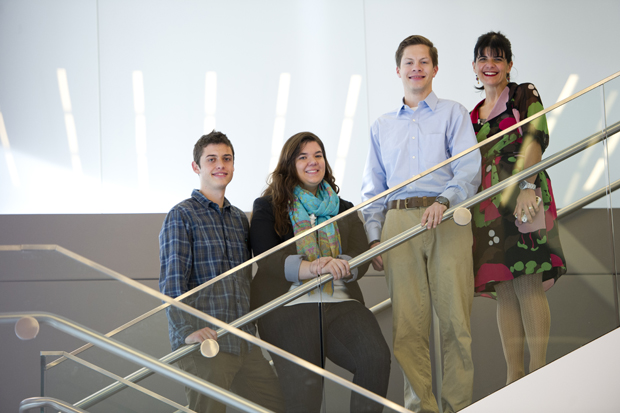Students join global leaders’ climate change mission

Victoria Porell, a fourth-year political science and international affairs combined major, frames climate change as the quintessential global issue, one which cannot be solved on a country-by-country basis. “Climate change is one of the first truly global human security problems,” she explained. “It’s not something that any one state can take on, because climate doesn’t understand borders.”
Porell was one of three Northeastern students who attended the 18th United Nations Framework Convention on Climate Change in Doha, Qatar. The event ran from Nov. 26 to Dec. 8, and convened some 19,000 delegates from more than 190 countries to negotiate a framework for reducing greenhouse gas emissions.
This was the third year in which a contingent of Northeastern students has attended the convention. Denise Garcia, an associate professor of political science and international affairs, has organized each of the experiential-learning opportunities, which have also included conferences in Denmark in 2009 and South Africa in 2011.
“Climate change is the most complicated area of world politics and one of the hardest issues to move along the political spectrum,” she said. “By attending the convention, students got a glimpse of how world politics works.”
Over the course of the conference, the trio of Northeastern participants networked with members of the global youth constituency YOUNGO, some of whom hail from countries in Europe and Middle East; attended panel discussions featuring prominent political figures such as Ban Ki-Moon, the Secretary-General of the United Nations; and even co-sponsored a side event with the Intergovernmental Panel on Climate Change.
Andonis Marden, a fifth-year political science and international affairs combined major who attended the conference, is particularly interested in the relationship between climate change and migration. Last semester, for example, he collaborated with the deputy director of the Geneva Centre for Security Policy on a research paper focused on the potential impact of climate change on the population of Australia. The paper, which was published by the Lowy Institute for International Policy, posits that natural disasters in the Pacific Islands have the potential to displace thousands of people, many of whom could end up as environmental migrants in Australia within the next decade.
“Hurricanes and tsunamis could have a sudden impact on vulnerable human populations,” Marden explained, adding that climate-induced displacement affects a disproportionate number of citizens in developing nations.
Michael Green, a conference attendee and fifth-year international affairs and environmental studies combined major, described a potential iteration of the worst-case global warming scenario and then offered hope that such a catastrophe would never occur. “There would be massive flooding and millions of people would be forced into becoming climate refugees,” he said, “but we can mitigate and address these challenges now.”
To that end, delegates who attended COP 18 formalized language addressing loss and damage as a result of extreme weather events and extended the Kyoto Protocol, a code of conduct that requires industrialized countries to reduce greenhouse gas emissions.
Marden, Porell, and Green think big-picture environmental health, too, but they are also committed to small-scale ecofriendly practices. Porell, for example, chooses not to eat meat, citing agriculture’s impact on greenhouse gas emissions.
“Agriculture emits more methane into the air than all forms of transportation combined,” she said.





